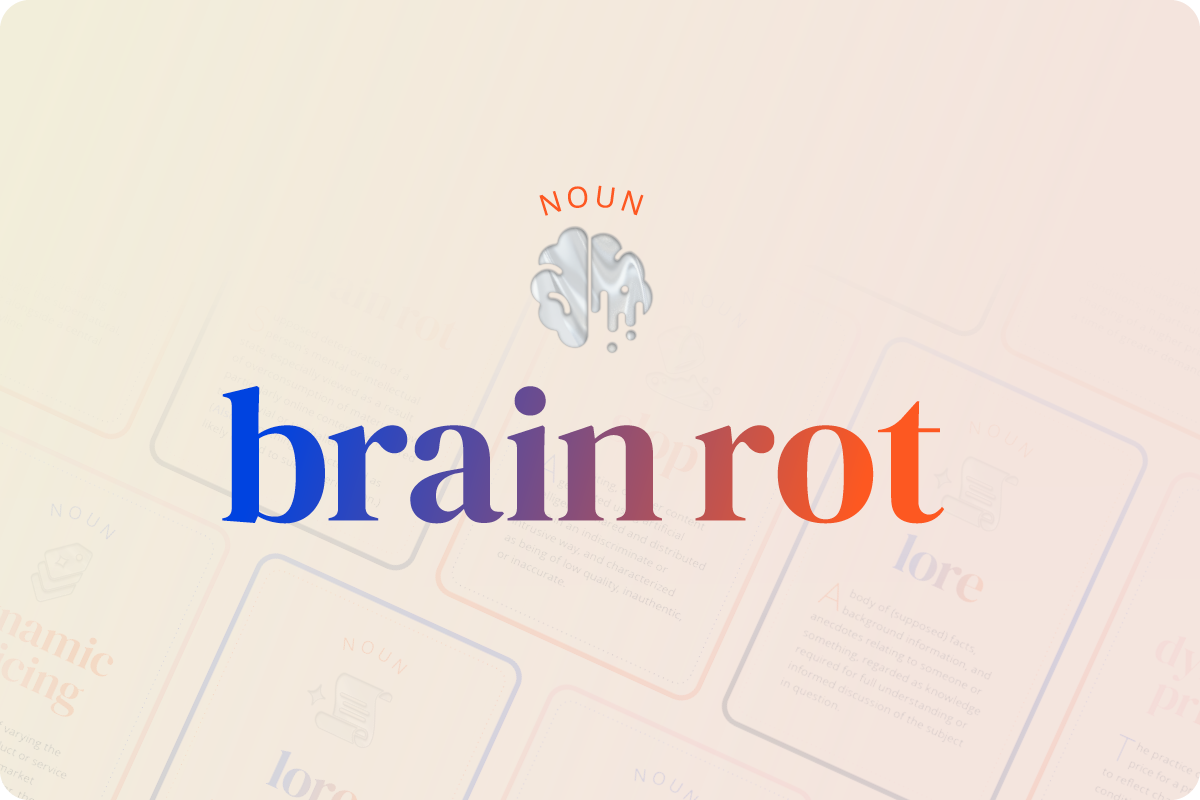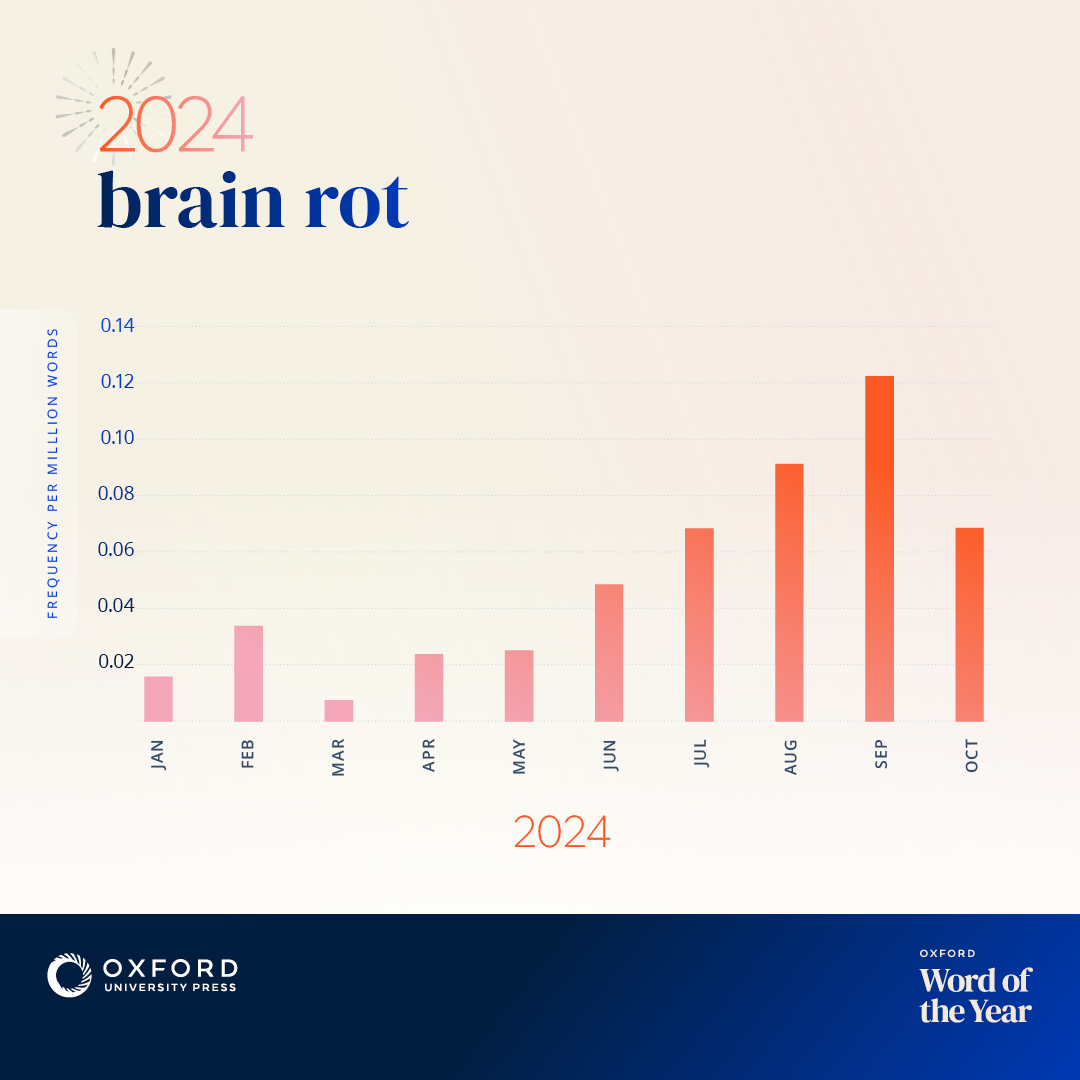‘Brain rot’ named Oxford Word of the Year 2024


Following a public vote in which more than 37,000 people had their say, we’re pleased to announce that the Oxford Word of the Year for 2024 is ‘brain rot’.
Our language experts created a shortlist of six words to reflect the moods and conversations that have helped shape the past year. After two weeks of public voting and widespread conversation, our experts came together to consider the public’s input, voting results, and our language data, before declaring ‘brain rot’ as the definitive Word of the Year for 2024.
Why ‘brain rot’?
‘Brain rot’ is defined as “the supposed deterioration of a person’s mental or intellectual state, especially viewed as the result of overconsumption of material (now particularly online content) considered to be trivial or unchallenging. Also: something characterized as likely to lead to such deterioration”.
Our experts noticed that ‘brain rot’ gained new prominence this year as a term used to capture concerns about the impact of consuming excessive amounts of low-quality online content, especially on social media. The term increased in usage frequency by 230% between 2023 and 2024.
The first recorded use of ‘brain rot’ was found in 1854 in Henry David Thoreau’s book Walden, which reports his experiences of living a simple lifestyle in the natural world. As part of his conclusions, Thoreau criticizes society’s tendency to devalue complex ideas, or those that can be interpreted in multiple ways, in favour of simple ones, and sees this as indicative of a general decline in mental and intellectual effort: “While England endeavours to cure the potato rot, will not any endeavour to cure the brain-rot – which prevails so much more widely and fatally?”

The term has taken on new significance in the digital age, especially over the past 12 months. Initially gaining traction on social media platform—particularly on TikTok among Gen Z and Gen Alpha communities—’brain rot’ is now seeing more widespread use, such as in mainstream journalism, amidst societal concerns about the negative impact of overconsuming online content.
In 2024, ‘brain rot’ is used to describe both the cause and effect of this, referring to low-quality, low-value content found on social media and the internet, as well as the subsequent negative impact that consuming this type of content is perceived to have on an individual or society.
It has also been used more specifically and consistently in reference to online culture. Often used in a humorous or self-deprecating manner by online communities, it is strongly associated with certain types of content—including creator Alexey Gerasimov’s viral Skibidi Toilet video series, featuring humanoid toilets, and user-generated ‘only in Ohio’ memes, which reference bizarre incidents in the state. This content has given rise to emerging ‘brain rot language’—such as ‘skibidi’, meaning something nonsensical, and ‘Ohio’, meaning something embarrassing or weird—which reflects a growing trend of words originating in viral online culture before spreading offline into the ‘real world’.
Now also gaining momentum is a broader, more serious conversation about the potential negative impact that excessively consuming this content might have on mental health, particularly in children and young people. Earlier this year, a mental health centre in the US even published advice online about how to recognize and avoid ‘brain rot’.
Speaking about this year’s selection process and the 2024 winner, Casper Grathwohl, President of Oxford Languages, said:
“It’s been insightful and deeply moving to see language lovers all over the world participate and help us select the Oxford Word of the Year 2024.
“Looking back at the Oxford Word of the Year over the past two decades, you can see society’s growing preoccupation with how our virtual lives are evolving, the way internet culture is permeating so much of who we are and what we talk about. Last year’s winning word, ‘rizz’, was an interesting example of how language is increasingly formed, shaped, and shared within online communities. ‘Brain rot’ speaks to one of the perceived dangers of virtual life, and how we are using our free time. It feels like a rightful next chapter in the cultural conversation about humanity and technology. It’s not surprising that so many voters embraced the term, endorsing it as our choice this year.
“I find it fascinating that the term ‘brain rot’ has been adopted by Gen Z and Gen Alpha, those communities largely responsible for the use and creation of the digital content the term refers to. These communities have amplified the expression through social media channels, the very place said to cause ‘brain rot’. It demonstrates a somewhat cheeky self-awareness in the younger generations about the harmful impact of social media that they’ve inherited.”
Find out more about our Word of the Year shortlist for 2024, and discover our winners from the past two decades as we celebrate 20 years of Oxford Word of the Year.



